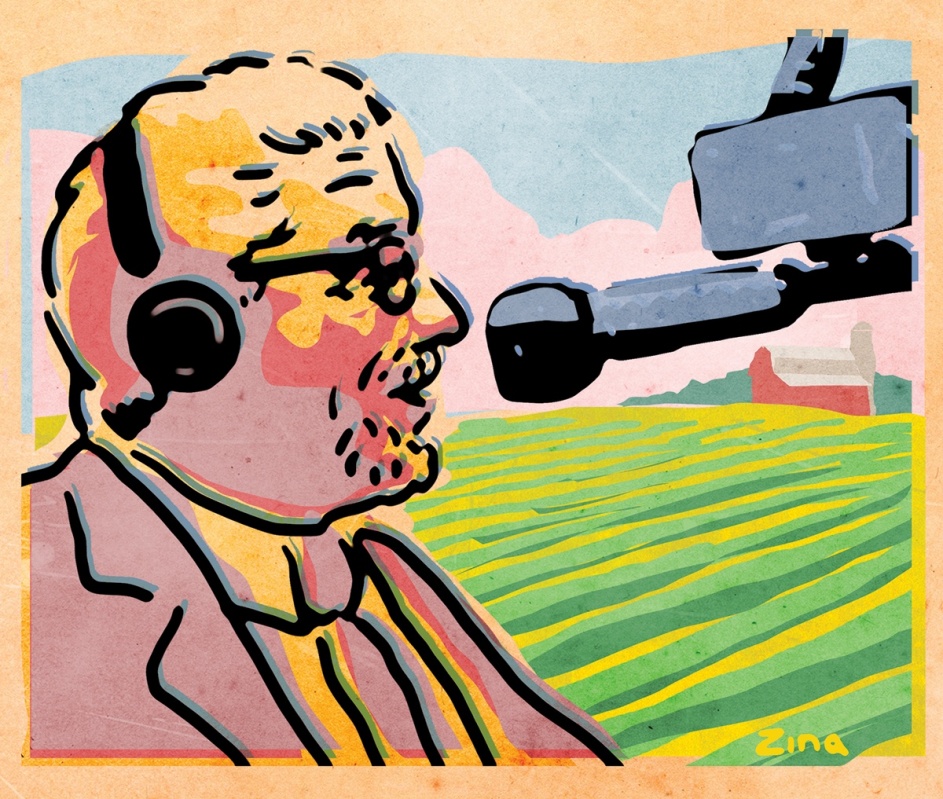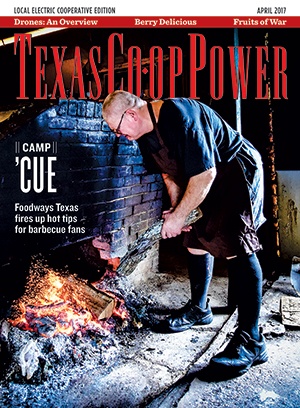Listeners of the Texas Farm Bureau Radio Network will soon miss Curt Lancaster’s familiar drawl. Fifteen years ago, his voice was the first one over the airwaves of TFBR as he ushered in the new agriculture radio network. Lancaster has guided TFBR from only a handful of stations to more than 70 today.
Farmers and ranchers, along with a wide swath of those working in agriculture, listen to farm radio for weather and industry news. The National Association of Farm Broadcasting says more than 80 percent of farmers tune in to farm radio several times a week. For 35 of the 50 years he has been on the air, farmers and ranchers have listened to Lancaster deliver the news they need.
When Lancaster was a boy growing up on a cotton farm in Garza County (in the Lyntegar Electric Cooperative service area), he developed an obsession with radio. In his parents’ barn, he fashioned a nonworking radio console, tinkering with dials and talking into a microphone he devised for his makeshift studio.
Lancaster pursued his interest by hanging around the local radio station. Staff members gave him The Associated Press scripts they read on the air. Lancaster took the scripts home and practiced delivering the news from his homemade studio using his best radio voice. Once he got older, they gave him a job.
“You know what they say, ‘Hang around long enough, they’ll give you a job,’ and that is what happened to me,” Lancaster says.
His first radio assignment was covering a local high school football game.
“I was just awful!” he recalls.
A few weeks after his sports debut, the station owner’s wife, only hours from giving birth, was on the air because there was no one to fill in for her. Spotting the 16-year-old, the owner inquired about his ability to run the control board. Lancaster assured him he could, and the couple hurried to the hospital, leaving Lancaster on the air.
The owner had been unimpressed with Lancaster’s sports coverage, but he was excited about how well the young man worked in the studio. He offered the teen a job.
“I loved being a disc jockey,” Lancaster says. “I could be a disc jockey to this day.”
He loved the music, and he has always been a weather nerd—something that has helped him throughout his career in farm radio. After graduating from high school, Lancaster continued to work in radio and eventually creative services and television, too.
In 1981, Roddy Peoples, a friend and the owner of Voice of Southwest Agriculture Radio Network, asked to meet with him. The two shared farm upbringings and an interest in airplanes and radio work. On occasion, Lancaster sat in for Peoples on his radio show.
Before long, Peoples wanted Lancaster to come work for VSA to deliver farm news. Lancaster accepted the job, and for the next 20 years, he was the voice of farm news for the network. Peoples eventually sold VSA to Clear Channel Communications (now iHeart Media), and Lancaster stayed on for several years as general manager before striking out on his own.
Shortly after leaving VSA, Lancaster was approached about starting a radio network with the Texas Farm Bureau. At first he declined because he enjoyed working on other projects, but he reconsidered after talking to his wife. He knew and loved farm radio and had even served as president of the National Association of Farm Broadcasting. Once he changed his mind, the foundation for TFB Radio Network was laid.
“As we were building out the studio, I remember looking at this big Texas map on my wall. I usually put stickers on it for every radio station. At that time, there were zero stickers and I was having a sinking spell. I realized the enormity of the job.”
Texas Farm Bureau Radio went live in December 2001. By January 2002, it had six stations. Today, there are 73 stations, and their programming is heard in more than 200 Texas counties. Shows are broadcast on AM and FM stations and in digital format for computers. The network’s broadcasts can be downloaded to smartphones for listening anytime.
“About 95 percent of our content is interviews,” Lancaster says. “It’s very little of what the industry calls ‘rip and read,’ and that sets us apart. I talk about agriculture and anything that impacts the rural parts of the state.”
As anchor of Texas News and Views on TFB Radio, Lancaster interviewed farmers and ranchers from across the state. He also had questions for President George H.W. Bush (who accepted Lancaster’s call to the White House), and governors Rick Perry and George W. Bush. One of his most memorable interviews was with astronaut Charlie Duke, who was the lunar module pilot for Apollo 16.
Although many listeners catch the weather and agribusiness news they need in the same manner that Lancaster began delivering it a half century ago—through the radio—more are beginning to listen to his show and others on the web, or by downloading broadcasts to their smartphones.
How the listeners hear the TFBR broadcasts doesn’t really matter to Lancaster. For him, it was always about the conversations he had.
——————–
LaDawn Fletcher is a Houston-area writer who enjoys writing about Texas.


